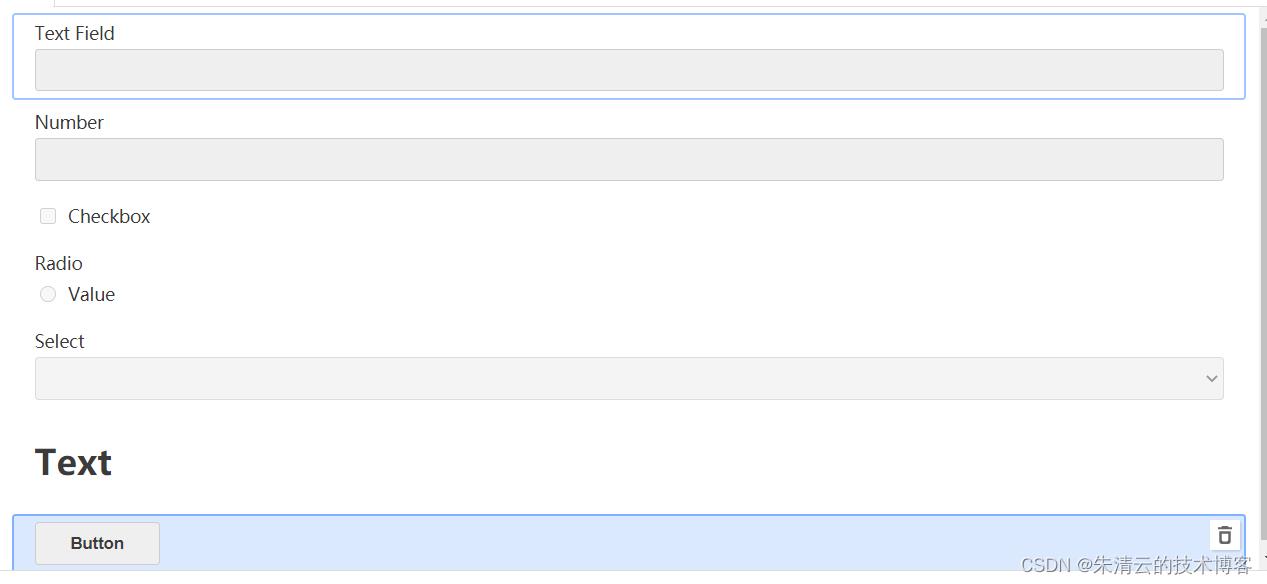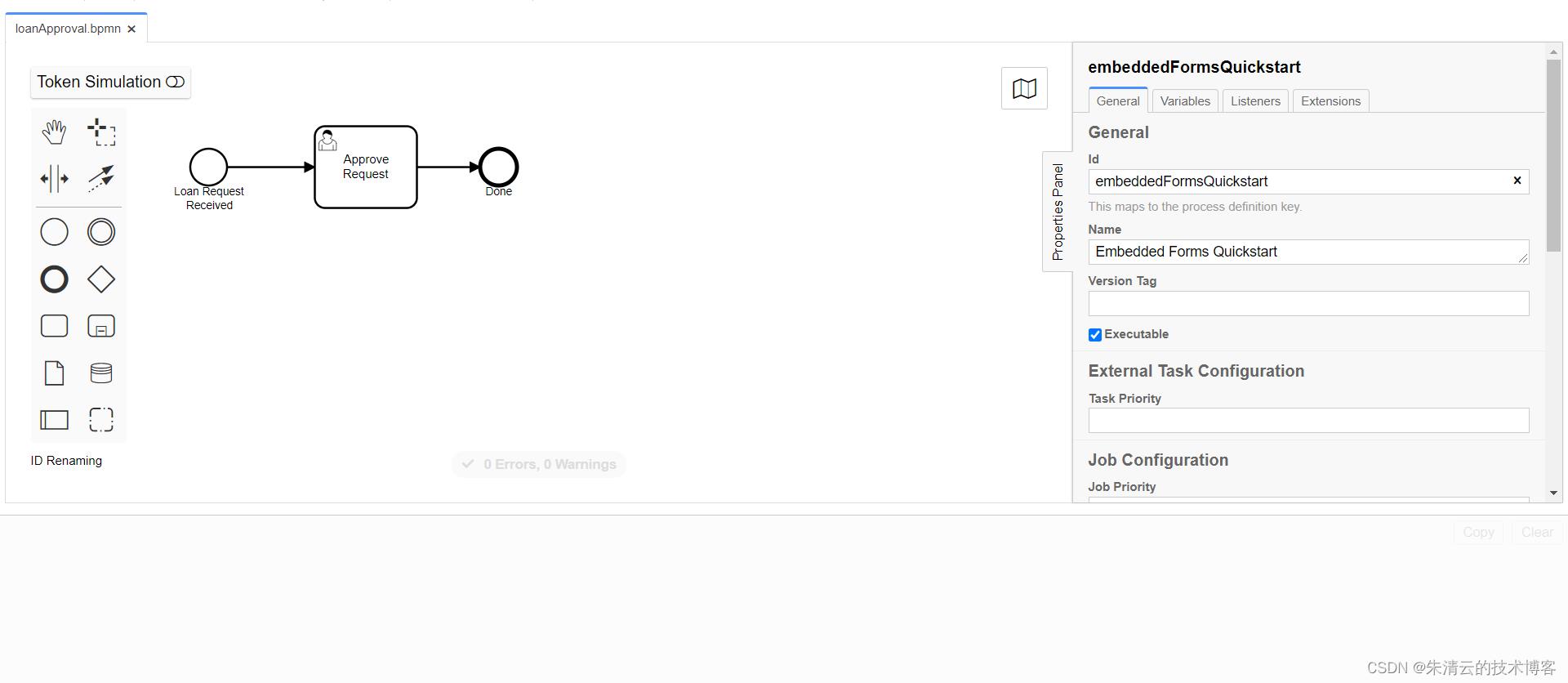[11]深入浅出工作开源框架Camunda:部署HTML表单
Posted 朱清云的技术博客
tags:
篇首语:本文由小常识网(cha138.com)小编为大家整理,主要介绍了[11]深入浅出工作开源框架Camunda:部署HTML表单相关的知识,希望对你有一定的参考价值。
Camunda不仅仅支持类似于JSON格式的表单,也支持html格式的表单。支持Camunda JSON表单格式比较简单,比如类似下面的表达。
"schemaVersion": 2,
"components": [
"label": "Text Field",
"type": "textfield",
"id": "Field_0kpmyne",
"key": "field_1kjqk1b"
,
"label": "Number",
"type": "number",
"id": "Field_1pp63a0",
"key": "field_1iy0fgh"
,
"label": "Checkbox",
"type": "checkbox",
"id": "Field_09m9mbv",
"key": "field_1iufp4h"
,
"values": [
"label": "Value",
"value": "value"
],
"label": "Radio",
"type": "radio",
"id": "Field_0tanpr2",
"key": "field_0wz7jwp"
,
"values": [
"label": "Value",
"value": "value"
],
"label": "Select",
"type": "select",
"id": "Field_0uvqqg4",
"key": "field_0vwokcn"
,
"text": "# Text",
"type": "text",
"id": "Field_1mmwz20"
,
"action": "submit",
"label": "Button",
"type": "button",
"id": "Field_1kwxmg4",
"key": "field_184exnw"
],
"type": "default",
"id": "Form_1kmjw6v"
其UI视图如下:

那么如果需要部署一个带表单的应用,且是独立部署,不是把流程和html表单嵌入到Java应用里面应该如何做呢?
比如下面的流程和表单。

其流程文件(loanApproval.bpmn)源码如下:
<?xml version="1.0" encoding="UTF-8"?>
<bpmn2:definitions xmlns:xsi="http://www.w3.org/2001/XMLSchema-instance" xmlns:bpmn2="http://www.omg.org/spec/BPMN/20100524/MODEL" xmlns:bpmndi="http://www.omg.org/spec/BPMN/20100524/DI" xmlns:camunda="http://camunda.org/schema/1.0/bpmn" xmlns:dc="http://www.omg.org/spec/DD/20100524/DC" xmlns:di="http://www.omg.org/spec/DD/20100524/DI" id="_r7y_gEa-EeO5NO3lqhkDkg" targetNamespace="http://camunda.org/examples" exporter="Camunda Modeler" exporterVersion="4.11.1" xsi:schemaLocation="http://www.omg.org/spec/BPMN/20100524/MODEL BPMN20.xsd">
<bpmn2:process id="embeddedFormsQuickstart" name="Embedded Forms Quickstart" isExecutable="true">
<bpmn2:startEvent id="StartEvent_1" name="Loan Request Received" camunda:formKey="embedded:deployment:start-form.html">
<bpmn2:outgoing>SequenceFlow_1</bpmn2:outgoing>
</bpmn2:startEvent>
<bpmn2:sequenceFlow id="SequenceFlow_1" sourceRef="StartEvent_1" targetRef="UserTask_1" />
<bpmn2:endEvent id="EndEvent_1" name="Done">
<bpmn2:incoming>SequenceFlow_3</bpmn2:incoming>
</bpmn2:endEvent>
<bpmn2:userTask id="UserTask_1" name="Approve Request" camunda:formKey="embedded:deployment:task-form.html" camunda:assignee="demo">
<bpmn2:incoming>SequenceFlow_1</bpmn2:incoming>
<bpmn2:outgoing>SequenceFlow_3</bpmn2:outgoing>
</bpmn2:userTask>
<bpmn2:sequenceFlow id="SequenceFlow_3" sourceRef="UserTask_1" targetRef="EndEvent_1" />
</bpmn2:process>
<bpmndi:BPMNDiagram id="BPMNDiagram_1">
<bpmndi:BPMNPlane id="BPMNPlane_1" bpmnElement="embeddedFormsQuickstart">
<bpmndi:BPMNEdge id="BPMNEdge_SequenceFlow_3" bpmnElement="SequenceFlow_3" sourceElement="_BPMNShape_UserTask_3" targetElement="_BPMNShape_EndEvent_8">
<di:waypoint x="398" y="118" />
<di:waypoint x="460" y="118" />
<bpmndi:BPMNLabel>
<dc:Bounds x="533" y="268" width="0" height="0" />
</bpmndi:BPMNLabel>
</bpmndi:BPMNEdge>
<bpmndi:BPMNEdge id="BPMNEdge_SequenceFlow_1" bpmnElement="SequenceFlow_1" sourceElement="_BPMNShape_StartEvent_3" targetElement="_BPMNShape_UserTask_3">
<di:waypoint x="212" y="118" />
<di:waypoint x="298" y="118" />
<bpmndi:BPMNLabel>
<dc:Bounds x="347" y="268" width="0" height="0" />
</bpmndi:BPMNLabel>
</bpmndi:BPMNEdge>
<bpmndi:BPMNShape id="_BPMNShape_StartEvent_3" bpmnElement="StartEvent_1">
<dc:Bounds x="176" y="100" width="36" height="36" />
<bpmndi:BPMNLabel>
<dc:Bounds x="160" y="136" width="69" height="27" />
</bpmndi:BPMNLabel>
</bpmndi:BPMNShape>
<bpmndi:BPMNShape id="_BPMNShape_EndEvent_8" bpmnElement="EndEvent_1">
<dc:Bounds x="460" y="100" width="36" height="36" />
<bpmndi:BPMNLabel>
<dc:Bounds x="465" y="136" width="27" height="14" />
</bpmndi:BPMNLabel>
</bpmndi:BPMNShape>
<bpmndi:BPMNShape id="_BPMNShape_UserTask_3" bpmnElement="UserTask_1">
<dc:Bounds x="298" y="78" width="100" height="80" />
</bpmndi:BPMNShape>
</bpmndi:BPMNPlane>
</bpmndi:BPMNDiagram>
</bpmn2:definitions>
其有两个表单,启动的节点(Load Request Recevied)和用户任务(Approve Request)。
其分别关联了下面的表单:
(1)开始节点的表单(start-form.html)
<h3>Embedded Forms Quickstart</h3>
<form role="form"
name="variablesForm">
<div class="row">
<div class="col-xs-6">
<h2>Loan Data</h2>
<!-- Loan Type -->
<div class="form-group">
<label for="selectLoanType">Type of the loan</label>
<div class="controls">
<!--select box -->
<select id="selectLoanType"
required
class="form-control"
name="loanType"
cam-variable-name="loanType"
cam-variable-type="String"
ng-change="calculateLoan()">
<option value="mortage" checked>Mortage Loan (5%)</option>
<option value="cashAdvance">Cash Advance (10%)</option>
</select>
</div>
<!-- Custom validation message for select box -->
<p ng-if="variablesForm.loanType.$invalid" style="color: red">
Please select a loan type.
</p>
</div>
<!-- Loan Amount -->
<div class="form-group">
<label for="inputLoanAmount">Amount</label>
<div class="controls">
<input id="inputLoanAmount"
required
class="form-control"
cam-variable-type="Double"
cam-variable-name="loanAmount"
min="1000"
ng-change="calculateLoan()"
name="loanAmount"
type="number"/>
</div>
</div>
<!-- Runtime in Years -->
<div class="form-group">
<label for="inputLoanRuntime">Runtime (Years)</label>
<div class="controls">
<input id="inputLoanRuntime"
required
class="form-control"
cam-variable-type="Double"
cam-variable-name="loanRuntime"
min="2" max="30"
ng-change="calculateLoan()"
name="loanRuntime"
type="number"/>
</div>
</div>
<!-- calculate monthly payment -->
Projected monthly payment:
<p ng-if="monthlyPayment" class="alert alert-success">
monthlyPayment€ at interest% interest rate.
</p>
<p ng-if="!monthlyPayment" class="alert alert-danger">
Invalid selection.
</p>
<!-- The following code demonstrates use of custom scripting.
The 'cam-script' directive makes sure the the script is loaded and can bind to the angular $scope for the form.
Access to form fields is provided through $scope.variablesForm.
-->
<script cam-script type="text/form-script">
$scope.calculateLoan = function()
var form = $scope.variablesForm;
if(!form.loanType.$valid || !form.loanAmount.$valid || !form.loanRuntime.$valid)
$scope.monthlyPayment = undefined;
else
var loanAmount = form.loanAmount.$modelValue;
var years = form.loanRuntime.$modelValue;
var loanType = form.loanType.$modelValue;
var interestRate = 0;
if(loanType == "mortage")
interestRate = 0.05;
else if(loanType == "cashAdvance")
interestRate = 0.10;
$scope.interest = 100 * interestRate;
// calculate monthly payment using special formula provided by Bobby G
$scope.monthlyPayment = Math.round((loanAmount * ((Math.pow((1+interestRate),years)*interestRate) / (Math.pow((1+interestRate),years)-1))) * (1/12));
以上是关于[11]深入浅出工作开源框架Camunda:部署HTML表单的主要内容,如果未能解决你的问题,请参考以下文章